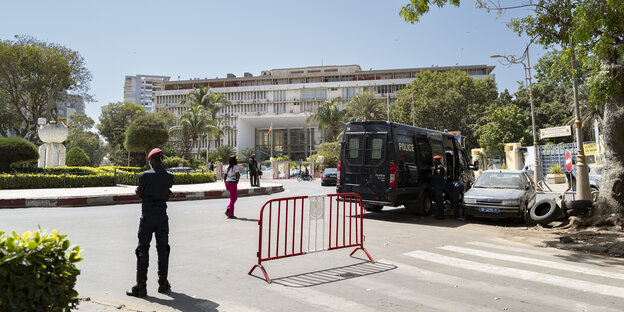Senegal's Parliament met for hours to discuss the controversial postponement of the elections. There were protests in front of the building. A new date has already been set.

The police secured the National Assembly against protests and used tear gas Photo: Sylvain Cherkaoui/dpa
DAKAR taz | On the third day after Senegal's president, Macky Sall, announced that he would postpone the presidential elections scheduled for February 25, things remain calm in the capital, Dakar. Police officers who in recent days were still standing at roundabouts and central intersections have withdrawn. People are driving to work again. At least for now, everyday life seems to have returned.
On Tuesday night, the fears of sectors of the opposition and government critics were confirmed: President Macky Sall will remain in power, possibly for almost a year. While the presidential election was initially said to be postponed by six months, it is now scheduled for December 15. Sall will be head of state until his successor takes office. If there is a second round, it could last until the end of January or even the beginning of February.
This was preceded by an hour-long parliamentary session that began on Monday morning. It was broadcast via livestream. However, almost no one could see it: the mobile Internet also did not work on Tuesday afternoon. The Ministry of Communications is officially said to have disabled it so as not to disturb public peace with hate messages. The Committee to Protect Journalists (CPJ) called on the government to restart it immediately.
Many missed a spectacular and tumultuous debate. First there were hours of discussion about procedure and whether the bill to postpone the elections was even up for discussion. When the real exchange of blows began, about two dozen opposition members occupied the main podium to prevent the vote.
Police take away opposition politicians
The most famous face: MP Guy Marius Sagna, who belongs to the camp of the best-known opposition politician, Ousmane Sonko. He is in prison and, therefore, cannot stand for election. His supporters are currently the most vocal critics of the postponement. Since he was found guilty of “endangering youth” last year, his candidacy was rejected. “What they are doing is not democratic, it is not republican,” said Sagna, draped in the Senegalese flag. In the short message service X, formerly Twitter, He demanded Macky Sall's resignation or compliance with the February 25 election date. The images show how he and other opposition politicians were surrounded by police and taken away after more than two hours; An unprecedented situation for Senegal.
The motion to adjourn would have required 99 votes out of 165 and therefore a three-fifths majority; In the end, 105 parliamentarians voted in favor. However, he also had the support of the opposition. Last week, the Democratic Party of Senegal (PDS) submitted a request to postpone the elections. Its candidate, Karim Wade, had previously been rejected by the Constitutional Council. The PDS provided the president with his father Abdoulaye Wade until 2012. He lost precisely against Macky Sall. This was seen as a great opportunity for the government sector, whose candidate Amadou Ba is considered colorless and weakened.
However, it is still unclear whether the scenario will actually hold. Ibrahima Kane, a lawyer and analyst at the Open Society Initiative for West Africa (Osiwa), says: “I am not sure if everything that has happened since Saturday is constitutional. “We are in a constitutional crisis.” Sall's term is eventually extended, violating two articles of the constitution. However, the development is dangerous for another reason: “What will happen if the Constitutional Council declares yesterday's bill unconstitutional? The mandate will then end on April 2. Is the President of the National Assembly responsible then? The Constitution does not regulate that,” Kane said.
Increasing hardness
The government had already suffered a huge loss of confidence. Since 2021, security forces have become increasingly harsh on protesters. According to Human Rights Watch in January, up to 1,000 civil society and opposition members have been arrested since then. The detainees are still waiting in prison for their trials. The government had contradicted the report.
Security forces have also stopped any demonstrations in recent days. The demonstration planned for Monday around the National Assembly did not even take place. The police always used tear gas to prevent even small groups from forming. It is not known if there will be new protests in the coming days. “People are a little burned out and looking to get organized,” Kane said. We are also awaiting legal clarification.